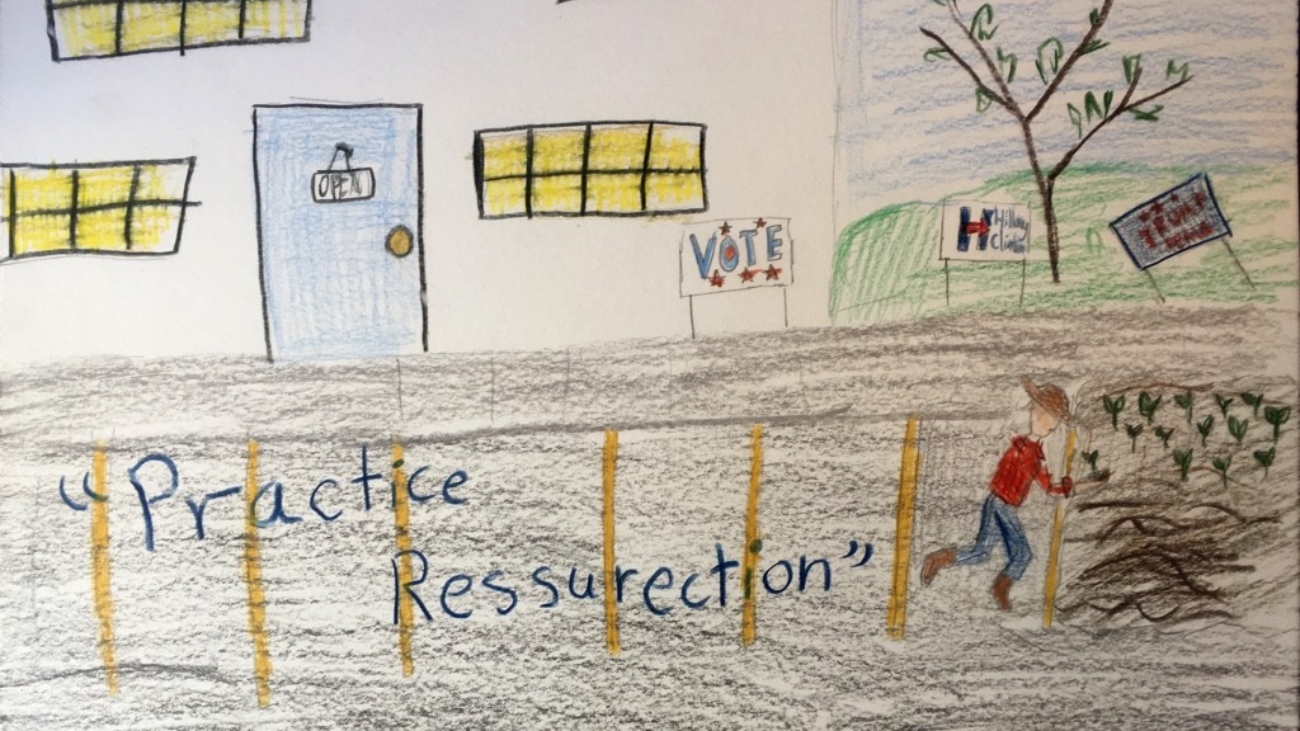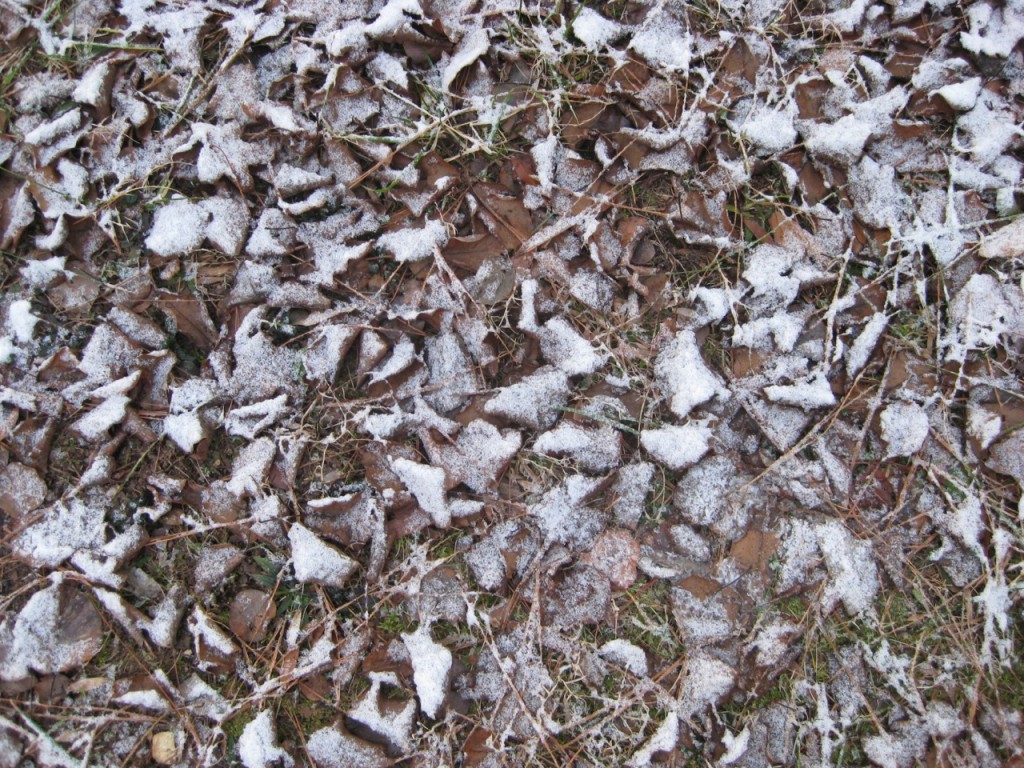We begin, dear boy, by defining a point—
σημεῖον, in Euclid’s Greek.
Zero length and zero width, zero
height, zero dimension. Zero substance,
mere indication, indistinguishable
from nonexistence—yet distinct.
On this invisible foundation
by surest logic we construct
our world. What is a line but points,
a plane but lines? What is a circle
but a set of points—of zeroes
equidistant from a zero? Thus
from nothing we derive perfection.
All else follows. Segments, angles,
polygons and polyhedra, Pythagoras
and Ptolemy and Plato, the five regular solids,
the heavenly spheres, sweet music
of the spheres, the earth a sphere revolving
round a sphere. Picture the sun as a basketball…
Yes, spheres and globes and basketballs,
and cylinders, mere circles piled on circles, holding
oatmeal, pots and pans and spooned brown
sugar, molasses, island plantations,
slavery and conquest, caravels with triangles for
sails that circumnavigate the globe, triangle
trade and revolutions, as of spheres, and civil
war and politics. Elections. Electric
light and darkness, Zippo lighters, candelabras,
Liberace, Lawrence Welk and Lady Gaga,
Laurie Grossman, making out backstage
in high school, lips like honey-
lemon Halls, and lace-trimmed panties.
Men have fought wars for less—
for nothing, come to think, which was my
point. All comes ex nihilo.
All comes to naught. Our sweetest
loves are cruel, and sense made mere excuse
for madness. Thus senselessness
is made our surest sense! The only firm
foundation’s nothing, and the light
of reason emanates from shadows. If
we stand upon the shoulders of a giant,
where does the giant stand? Best not look down.
Any questions? Excellent. Now
onto lesson two: the queue.
Cheap Sonnet No. eiπ+1. In Which the Poet Fails to Grasp His Meaning
The dry leaf crumbling in the toddler’s fist,
The cloud-form wind-rent at the careless naming,
The fluttering dream that flees the day’s periphery,
The memory-scent long rotted from its root:
The lover hard pursued will not be kissed
Nor love be raveled out from life’s polyphony;
The truth, that beaten dog, is loath to trust us
’Til it lay its head unbidden at our foot.
And still with art the cunning mind constructs
Its algorithms and its aqueducts
To calculate the right, to channel justice,
Enumerate the light and catch the raining…
Once holding, we behold what’s left us then:
Water wisps that cling to porcelain.
The Lord is not a shepherd
A sermon preached at St. Joseph’s Episcopal Church in Durham, N.C., on April 26, 2015.
I was determined that I was not going to stand up here and talk about sheep, but in thinking about today’s readings I kept being pulled back to the image of them—the shepherd, the flock, the pasture, the sheep. I have to admit I’m just not crazy about that image. It isn’t that I don’t like sheep. I do like sheep. I’ve toyed with the idea of having sheep some day. They’re relatively easy to manage, and they’re good for multiple purposes throughout their life cycles: they give wool, they give meat, some breeds even give milk. They can live off of relatively poor land. They can be integrated fairly easily into a multi-purpose farm and a household economy. And lambing season, if you don’t mind being kept up at night, is a glorious thing. Wendell Berry, one of a dwindling number of literal “good shepherds” the western world has left in this age of industrialized agriculture who also gives us his own eloquent descriptions of the experience, has this to say about keeping sheep:
The old shepherd comes to another
lambing time, and he gives thanks.
He has longed ever more strongly
as the weeks and months went by
for the new lives the ewes have carried
in their bellies through the winter cold.
Now in the gray mornings of barely
spring he goes to see at last
what the night has revealed. 1
Berry is a Christian, which I think shows through pretty clearly in his poetry—not that he is actively trying to convert anyone, but that he never strays very far from the image of rebirth. The care he takes for his sheep is the sort of care we’d want from our own Good Shepherd, but Berry’s is a very human shepherd—a humble one, who “gives thanks” for a lambing time that he, far from controlling in the manner of an industrial foreman or a software engineer, takes as a holy mystery.
- Wendell Berry, “VI” (2011), This Day: Collected and New Sabbath Poems (Counterpoint, 2013), p.365. ↵
What the snow reveals
Despite preemptive school closings and dire warnings of Black Ice, only a dusting of snow fell here last night — not even enough to cover the ground. A good snow, glistening contentedly in the morning sun, reflecting the clean clear blue sky after the cold front, hides the mess we’ve made of the world and gives the illusion of purity, a new beginning — “a revolution of snow,” as Billy Collins writes:
its white flag waving over everything,
the landscape vanished…
the government buildings smothered,
schools and libraries buried, the post office lost
under the noiseless drift,
the paths of trains softly blocked,
the world fallen under this falling.
But the world was already fallen, and Boris Pasternak thought the snow’s motives less than pure, seeing rather
That snow falls out of reticence,
In order to deceive.
Concealing unrepentantly
And trimming you in white
For Pasternak, indeed, snow may be nothing more than the Altoids on the breath of an alcoholic:
Cheap poetry, April 2013
If you’re new to this, read the Cheap Poetry Manifesto.
Scattered on the path, the maple blossoms
Drops of blood shed by the spring’s new birthing.
The rain will wash it clean, baptize the season.
The infant leaves, so pale and paper-smooth,
Uninked by summer, by insects yet unbitten,
Still bear the hope of every imaginable season:
A book that pleases most while yet unwritten.
Loblolly, lo unfaithful pine
Spills his seed upon the breeze,
Films in yellow yours and mine
And maketh every one to sneeze.
Some birds have songs that ring out like a bell tone,
But the wood thrush rings, I think, more like a cell phone.
I turn on the game: It’s 14 to 2,
The other guys. What is a Phils fan to do
With 8 runs to Halladay, 4 charged to Durbin?
Put down that beer, friend, and go for the bourbon.
Cheap poetry, January–March
It was a slow winter for poetry, but here’s the roundup. If you’re new to this, read the Cheap Poetry Manifesto.
The decorations are put away in pieces and in bitses
but the holiday ain’t over ’til we eat the Christmas citrus.
Despite the ululations
of nine year-old relations
that I know,
It just won’t snow.
Through the office window I hear
A trill so fine and dandy
I know whene’er it greets my ear
The birds are getting randy.
Hurrah for the porridge! A vegetarian hymn
An 1852 poem called “A Sensible Breakfast” praising oatmeal and all things vegetarian. Imagine a cross between a Pooh hum and a Methodist hymn.
The angry poet lashes out at his solicitors on election day
Damn you, sirs! My vote is not my voice!
—He cried in futile fury at his email—
As if for quadrennia I silent slumbered
And woke to make myself a number!
A vote is a mere puny choice
Of wan capitulations offered retail:
But my voice is the howl of the lonely wind
Failing to sway the barren trees;
The echo of a squirrel’s endless chatter,
The dove’s meek coo, the storm’s great clatter,
And the hum of a thousand angry bees
That dance in the air with a single mind.
My voice is the song of a crosscut saw,
The crash of canopies rent and torn,
And the requiem for a single leaf that falls
Alighting soundless on the forest floor.
My voice is the horn that blaring saves
The sinking ship from the roaring waves!
The laughter of children in spring-clad sun
And the sigh of a dandelion scattering its seeds!
My voice is the voice — the voice — the voice of a man who needs
A good stiff drink. —And so he had one.
On fallen leaves
A carpet of decay, as finely woven
As any ancient treasure dearly bought,
And lovelier for being more ephemeral:
All the artisans of Kublai Khan
In all the workshops of a mythic continent
Could not invent geometry so fair
As seven fallen oak leaves. Yet no one sees,
So none stand guard to make me wipe my feet
Before I walk on it.

